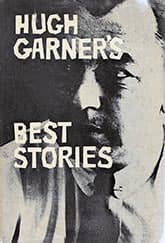Hugh Garner's Best Stories
Critique • Quotes
 First edition
First editionFirst publication
1963
Literature form
Story collection
Genres
Literary
Writing language
English
Author's country
Canada
Length
Approx. 90,000 words
The heart of a storyteller
I can't think of any Hugh Garner stories I like better than the twenty-four in this collection, so I guess these are his best. They're pretty good. In fact, it is difficult to think of anyone's stories I like better than these.
If you grew up in Canada since the 1960s, you probably know some of these stories. You've studied "The Conversion of Willie Heaps" or "One-Two-Three Little Indians" in school. These are stories that not only show with gritty realism the heart-breaking lives of their characters, but also carry clear moral messages such as anti-racism.
But although Garner is a feisty, iconoclastic writer for his time, he's at heart a storyteller with a profound interest in people. His moral purpose is just to show you others' lives, others' experiences, to make of them what you will.
Some of the tales you did not read in school, like "The Magnet" and "The Yellow Sweater", concern sexual tensions. "The Magnet" hardly mentions sex, yet the relation between the farm widow and the hired man in the story is thick with desire, jealousy and foolish pride. For me, it's the understated masterpiece of the collection.
Surprising impact
The Garner story that seems to have been anthologized most often is "The Yellow Sweater" though. It's a story of sexual chauvinism, a topic as relevant today as when it was first published in 1951. The story of a travelling businessman who picks up a female hitchhiker and comes on to her, is particularly interesting for being told from the perspective of the man, as we watch his self-righteousness gradually turn to guilt.
But, although the story is very well put together for surprising emotional impact, something about it has not aged well. Perhaps it is put together too deliberately. Perhaps the attitudes—of both characters—are too dated. But the story is still worth reading to see the mechanics of a story writer at work in his prime.
A few stories in this "best of" collection do not deal with characters but appear to be minor bits of memoir or journalism, like "How I Became an Englishman" (a great title at least), and are too slight to be of interest and probably should not have been included.
But then there's "E Equals MC Squared" that at first seems to have been written to justify such an impossibly dry title—and then turns into a moving piece of work.
For the most part these are classic stories, told with deceptive simplicity. The very best of them I would hold up against the best any county has to offer from the mid-twentieth century.
— Eric
Critique • Quotes

